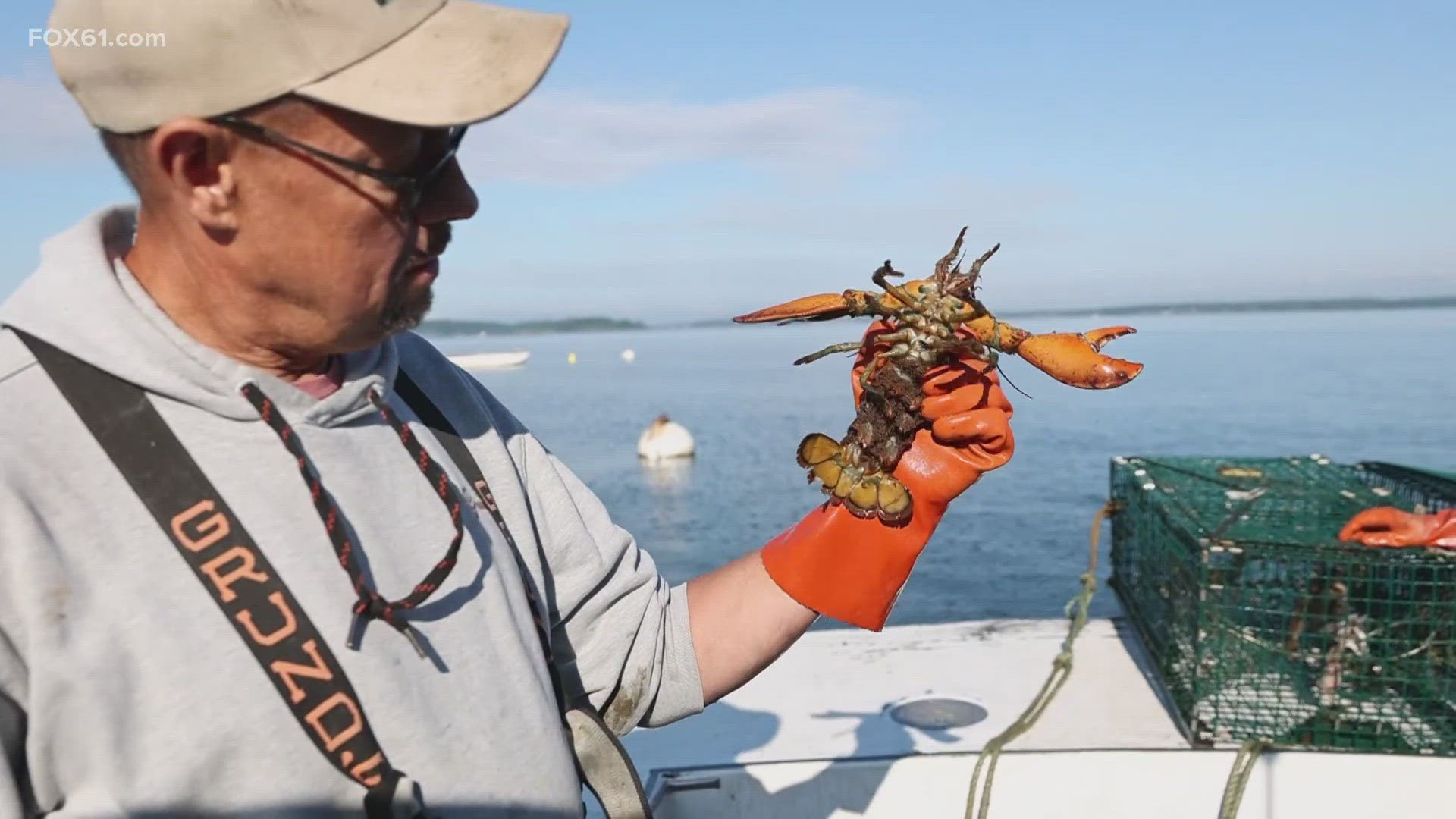BRANFORD, Conn. — The New England lobster industry has played a vital role in generations of fishermen’s lives. Kids as young as six years old are following in their parent’s footsteps, hauling traps to be a part of something bigger than themselves.
Many lobstermen thought they would be on the water until the day they die, but in Connecticut, that isn’t the case.
Poor climate conditions have caused an almost total decline in the lobster population across the Long Island Sound over two decades, ending lobstering careers.
DJ King is a former lobsterman from Branford. His livelihood is still on the water, but not reliant on lobsters.
He says his love for trapping came early.
“I started with ten wooden traps, I was in a small boat, I would go out with my father, we pulled them by hand and caught a few every day,” King said.
What started as just a hobby quickly turned into a lifestyle.
“We did very well with lobsters back then, it was very lucrative, King said. “We would get around 600 or 800 a day usually. like 60-70 per 10 trawl, the guys couldn’t band them fast enough.”
But one day, after years of the good life, the traps came up empty.
“It never rebounded from that ‘99 year when we were catching hundreds daily,” King said. “Then all the sudden the pots were empty, or the lobsters were coming up dead. Even if they were alive, they wouldn’t make it back to the docks.”
Fast forward 25 years, the hoped-for repopulation never happened.
“The under-over was two lobsters and we went under that number today, didn’t even get two,” King said.
There are currently zero full-time lobstermen in the Sound and only a handful of part-time.
King told FOX61 that the first to leave the business were those who were dependent on only lobsters; they didn’t have anything to fall back on.
The Department of Energy and Environmental Protection's Lobster Expert Colleen Bouffard explains that in 1999 a hurricane, pesticide runoff, parasites, and rising water temperatures clashed within weeks, suddenly turning the Long Island Sound hostile for lobsters.
“The peak of the fishery occurred in the late nineties,” Bouffard said. “We had 3.5 million pounds of lobster landed, pricing at $12 million, at that time 400 people in Connecticut landing lobster. In the last seven years, we’ve only had 130,000 pounds at $800,000.”
The lobstering industry in Connecticut trickled to a stop, forcing fishermen like King to diversify, or get out of the water.
“When the lobsters started to drop we instead did oysters, clamming, I ran a tug boat for a while, and then we did very well with conch,” King said.
King said he was one of the lucky ones, other types of fishing prevented him from financially sinking. Many of his colleagues weren’t so fortunate, forced to find a new career.
King is still on his boat every morning, but the only signs of the lobstering days are old t-shirts with the “DJ King Lobsters” logo on the back.
While the Connecticut lobster industry may have died off, the lobster capital of the world sits only 250 miles upshore in Maine.
Danny and Steve Train are brothers. They have been lobstering off Portland Maine’s coastline since they were kids.
“We try to haul 300 or so every day,” Steve said.
The climate and other factors Connecticut faces are not a problem up there, but still an issue closely monitored.
“We know there is going to be a fishery in the future,” Steve said. “I’m blessed to fish in Maine, the fishery will turn down. There are always low periods, and it will go back up but it’s never severe, we manage the fishery good.”
Steve said experts often test the gulf waters and watch environmental trends to ensure Mainers don’t have to one day give up the trapping life they love.
“When you have a collapse like they did in Long Island Sound, believe me, we feel for them I know I do. I know what it’s like to do this and to not do this anymore, it just feels like part of your life has ended I’m sure, I can’t imagine not being able to do this it’s who I am,” Steve said.
They said their addiction and love for the industry are what make the uncertainty of lobstering worth it in the end.
“I make a living, some years good, some years I wish I did something else, especially when I have to pay bills, but it’s part of who we are, it’s a cultural thing in the lobster community, it’s a big part of your life,” Steve said.
A testament all lobstermen have, present and past.
“We had some hard years, this is hard on the family and relationships, I think that there’s this thing with lobstermen there’s a lure to the sea,” King said.
Connecticut environment leaders said the newest study to determine the health of the lobsters in the Sound is currently being done and those results will be available next year, but marine biologists said they don’t expect encouraging results.
MORE:
---
Do you have a story idea or something on your mind you want to share? We want to hear from you! Email us at newstips@fox61.com
---
HERE ARE MORE WAYS TO GET FOX61 NEWS
Download the FOX61 News APP
iTunes: Click here to download
Google Play: Click here to download
Stream Live on ROKU: Add the channel from the ROKU store or by searching FOX61.
Stream Live on FIRE TV: Search ‘FOX61’ and click ‘Get’ to download.

